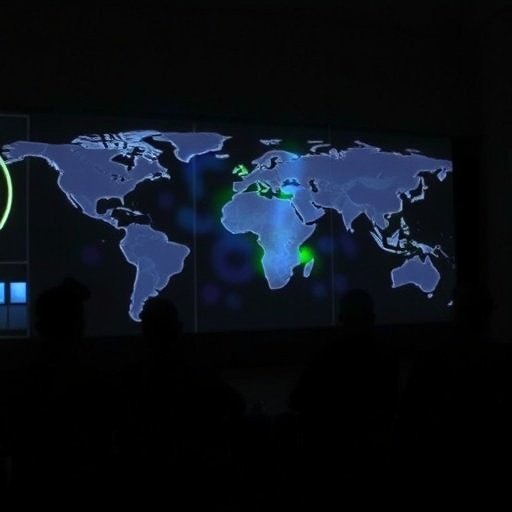In a groundbreaking study, researchers have unveiled startling disparities in radiology research output across different global regions, emphasizing the pressing need to address these inequalities in academic scholarship. The study, authored by a team led by Dr. Abdelwahab, meticulously dissects the multifaceted nature of radiological research and its distribution, revealing that certain areas, particularly in low-income nations, are disproportionately underrepresented. This marked imbalance not only affects the scientific community’s understanding of various health conditions but also the development of relevant clinical practices tailored to diverse populations.
Recent advancements in medical imaging technology and techniques have heightened interest in radiology, positioning it as an essential cornerstone of modern medicine. As healthcare evolves, radiologists are called upon to delve deeply into novel diagnostic and therapeutic avenues, thereby catalyzing research endeavors. However, this study highlights a critical paradox: while the demand for innovative research in radiology surges, the output of such research is significantly skewed based on geographical and socio-economic factors.
The multifaceted analysis conducted in this research spans various countries, evaluating both quantitative and qualitative metrics of research output. The researchers employed robust statistical frameworks to map research publications, funding sources, and institutional affiliations, drawing a complex picture of the current state of radiology research around the globe. This comprehensive approach provides a nuanced perspective on where research is flourishing and where it is faltering, underlining the critical need for equitable resource allocation.
Among the findings, one particularly striking revelation is the correlation between a country’s economic standing and its volume of published research in radiology. Wealthier nations consistently outproduce their lower-income counterparts in terms of research output. This disparity suggests systemic barriers that hinder researchers in less affluent nations from participating in the global academic conversation, including limited access to academic funding, fewer collaborative opportunities, and less visibility in international journals.
Moreover, the analysis shows that disparities extend beyond mere publication counts; they also encompass the quality and impact of the research produced. High-income regions tend to generate more high-impact studies that advance scientific knowledge significantly, while lower-income areas contribute less frequently to high-impact research, perpetuating a cycle of disadvantage. This uneven landscape of academic productivity poses ethical considerations in how global health issues are addressed, as the voices from low-research-output regions are often left unheard in pivotal discussions.
Further investigation into specific domains within radiology reveals that certain fields, such as pediatric radiology, experience even greater inequities. The nuances of pediatric care require specialized research efforts, which are often neglected in regions struggling with basic healthcare delivery. The implications of this oversight are profound, as children in underrepresented regions often suffer from critical health issues that could be mitigated through enhanced research efforts in pediatric imaging.
One of the researchers, Dr. Taha, noted that the findings are not merely academic but rather a clarion call to action. “We must confront these disparities head-on,” she stated, emphasizing that international collaborative efforts, increased funding for research in underrepresented areas, and dedicated platforms for sharing knowledge are essential to bridge the gap. Recognizing the value of diverse research perspectives can drive innovation and improve healthcare outcomes globally.
To compound the gravity of the study’s implications, the team also highlighted the role of institutional affiliations in shaping research outcomes. Often, institutions in high-income countries have access to extensive resources, mentorship programs, and global networks, which facilitate robust research activities. In contrast, institutions in economically challenged nations frequently lack similar support structures, perpetuating a cycle of underproduction in research.
In the context of health policy, the findings urge decision-makers to rethink funding allocations and international collaborations in research initiatives. By investing in low-income countries’ research capacities, not only can the inequities be addressed, but a more comprehensive understanding of global health challenges can be cultivated. This holistic approach could lead to more effective interventions tailored to diverse populations, ultimately enhancing the quality of care delivered worldwide.
Additionally, the researchers advocate for the adoption of equitable metrics when evaluating research output. Current metrics often favor quantity over quality, potentially overlooking impactful work produced in resource-poor settings. By establishing criteria that value innovative approaches and localized health challenges, the academic community can foster a more inclusive and representative body of research.
The publication motivated discussions at international conferences, inspiring collaborations among researchers from various backgrounds. By facilitating networking opportunities and resources for underrepresented scholars, the study has spurred a movement towards greater inclusivity in the radiology research domain.
In conclusion, this pivotal study serves as a reminder of the importance of equity in academic research. As the global health landscape continues to evolve, so too must the frameworks that govern research output. Uniting efforts across geographic and economic divides is not just a moral imperative but a necessity for advancing the field of radiology and, more broadly, improving health outcomes worldwide.
The call to action is clear, and the time for transformative change is now. By systematically addressing these inequities, the global community can ensure that every voice is heard and that every patient, regardless of where they live, receives the best possible care informed by comprehensive and inclusive research.
Subject of Research: Inequities in radiology research output
Article Title: Tracing global inequities in radiology research: a multi-level analysis of research output
Article References:
Abdelwahab, S., Taha, M., Farasani, A. et al. Tracing global inequities in radiology research: a multi-level analysis of research output.
Pediatr Radiol (2025). https://doi.org/10.1007/s00247-025-06388-y
Image Credits: AI Generated
DOI: https://doi.org/10.1007/s00247-025-06388-y
Keywords: inequity, radiology research, global health, pediatric imaging, academic disparities




